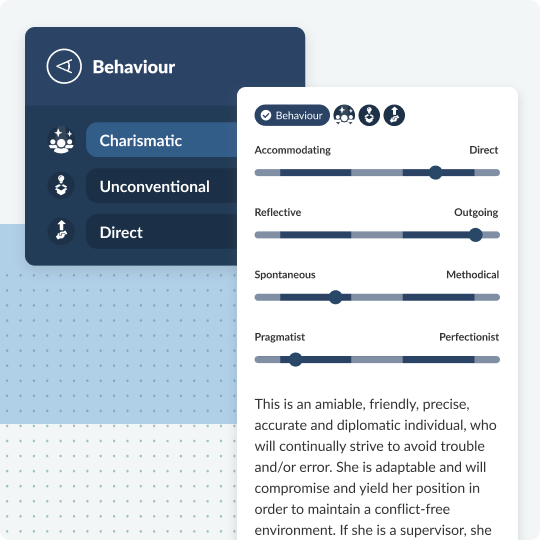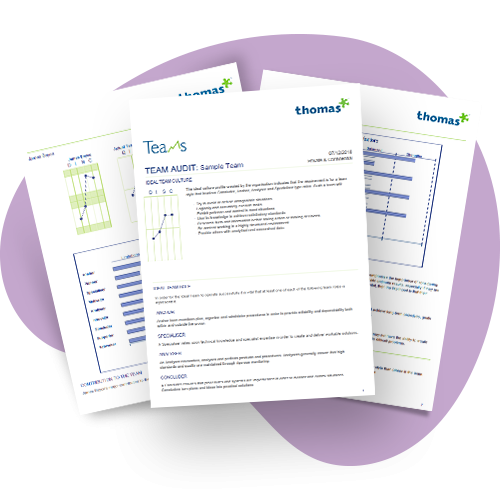Behavioral Assessments
Get insights into behavior at work
- Recruit smarter with people science
- Improve interactions across teams
- Increase engagement and collaboration
- Build a vibrant team culture
- Mitigate and resolve conflict
- Reduce staff attrition


Check out the latest reviews from our most delighted customers
Thomas' behavioral assessment
With the Thomas Behavior assessment, you can create a behavioral profile using Personal Profile Analysis. It measures your strengths, your room to grow and your preferred communication style. Use it with your team and improve communication, wellbeing and productivity.
How our behavior assessments work
It only takes eight minutes to get accurate insights into how people behave at work with Thomas.
8 minute assessment
You’ll get accurate insights into how each candidate behaves, communicates and what motivates them in the workplace. Factor in soft skills and hire someone who is the perfect fit for the role.
Detailed profile
Our science-backed behavior test gives insight on a person’s strengths, their communication style, what motivates them, and how they react to risk and conflict.
Deep insight
Use the insights our platform provides to make smarter hiring choices, move people into roles where they’d shine and really support your team by understanding them a bit better.

Assessment information
- Assessment type: Behavioral profile
- Format: 24 questions
- Time to complete: 8 minutes
- Training required: None
Validation:
We’re registered with the British Psychological Society and audited against technical criteria established by the European Federation of Psychologists’ Associations. This means our platform is built from science you can trust.
Read a sample candidate profile to see Thomas in action.

Our team sat the Thomas Behavior assessment, and we all found the results to be very accurate considering how few questions it asked. Using it to gain greater understanding and insight into candidates is invaluable when recruiting, and I can see it being an essential tool for managing a team as well.

We’ll help build a better team
The Thomas Teams Audit gives you insight that helps your teams perform to their maximum ability, and ensure that they are motivated and working towards a common set of goals – whether in a face-to-face, physical or hybrid environment.
Teams, used in conjunction with the Behavior assessment, will help your teams to understand their combined strengths, limitations and the value that the team brings to the organization. The insights it gives can:
- Boost the performance of your team through more effective management
- Help you to set a template of the ideal culture, roles and leadership style that your team needs to deliver its objectives
Thomas Teams provides you with a comprehensive report that can answer many questions such as:
- What role does each person play within the team?
- Where are the possible areas of limitation in the team?
- How can you address those limitations
- Are you playing to the strengths of each team member?
- Where could conflict be occurring?
- Is there a skills gap, and are there any training needs?
- What leadership style will best motivate and inspire the team towards high performance?

The theory
Our behavior assessments that create each Thomas profile are built from the scientific DISC theory of William Moulton Marston, developed for the workplace by Dr Thomas Hendrickson.
Our behavior assessments measure how someone sees themselves responding to situations in the workplace. Answering questions written by our psychologists, you’ll be able to see any patterns in your answers and your individual behavioral preferences and where it sits within the DISC theory: Dominance, Influence, Steadiness and Compliance.
Use science-backed insights to improve performance and create a high-performing team

Format
You’ll be asked to choose two trait adjectives out of four, one that is most like you and one least like you. It uses an ipsative referencing method, which means your answers are compared to yourself, rather than a comparison group. You’ll be given 24 questions and asked to choose between 96 words.
Our behavior assessment is available electronically or in paper-and-pencil format. It is suitable for anyone with a reading age of 11+ and who is fluent in English, including those whose first language isn’t English.

Reliability & validity
Our assessments undergo rigorous scientific tests to determine its reliability and validity as a psychological assessment. Our assessments are registered with the British Psychological Society, which means they’re audited against the technical criteria established by the European Standing Committee on Tests and Testing, part of the European Federation of Psychologists' Associations.
Our in-house psychologists continually undergo psychometric research with the PPA and have collaborated with the Psychometrics Centre at Cambridge University. If you’d like to support our continuous development programs, get in touch with our psychology team.
Frequently Asked Questions
What is a behavioral assessment test?
A behavioral assessment test is a tool designed to observe, understand, explain, and predict a person’s behavior. It helps us understand many different aspects of a person’s character, including their thinking style, willingness to learn, and leadership capabilities. Being able to predict how someone will behave on the job, work with others, overcome setbacks, or apply themselves in problem-solving situations is directly linked to achieving job-related goals and, in turn, achieving business goals.
How does a behavioral assessment test work?
The Thomas behavior assessment test creates a behavioral profile using Personal Profile Analysis (PPA). Based on the DISC theory, a behavioral assessment analyzes a person’s fears, motivators, values, and behavioral style using four main profile factors: Dominance, Influence, Steadiness, and Compliance. Our predictive behavior assessment takes these profile factors into account and tests candidates' attitudes in each area. Analyzed by proprietary technology, the results are presented in an easy-to-read graph format. Insights gained from the assessment can be used to place candidates in roles they are likely to thrive.
Why use behavioral assessments in the workplace?
Employee behavioral assessments help organizations and recruiting managers understand a person's level of interpersonal skills and help predict how they might respond to new and different scenarios. While a person may be hired for having the right skills, knowledge, and technical expertise, they are most often fired, reassigned, or overlooked for promotion because they lack the appropriate soft skills. Using behavioral assessments for hiring helps to ensure that the best-fitting candidates are hired, and, that the right people are promoted. They enable self-awareness and better communication in the workplace.
How can behavioral assessments tools help recruitment?
Behavioral assessment tools take the guesswork out of recruitment by helping to predict a candidate’s ability to succeed in different areas. Behavioral assessments remove unconscious bias from the candidate selection. Regardless of their age, gender, or ethnicity, candidates are chosen based on predictions and an analysis of how they will behave within the organization and in their roles.
Based on the widely recognized DISC theory (Dominance, Compliance, Influence, and Steadiness), using real-time results, the employer or recruitment manager can confidently analyze the candidate’s behavior and quickly determine if they are suitable for the role. If you would like to learn more about our behavioral assessment tools, please speak to one of our team members.
What is the difference between behavioral assessments and a personality test?
Behavioral assessments look to understand how a person acts or reacts to surroundings, roles, and other people; it is an expression of himself or herself. A personality assessment is about understanding who a person is based on an amalgamation of qualities and characteristics.
A behavioral assessment looks at how a person might respond within a role or in a set of circumstances. For example, a person generally described as "calm, warm, and friendly" might become "tense and explosive" in a stressful situation. However, the same personality traits in a different person might reveal that they thrive under stressful situations.
A personality assessment is designed to understand the total character of a person. Personality is the combination of values, views, set responses, patterns of thought, and characteristics, which are relatively stable aspects of an individual. Behavior, on the other hand, is how that individual comes across to others in their actions.
In summary, behavior is what we do; personality is why we tend to behave in a certain way.
What is involved in a behavioral assessment?
The Thomas Behavioral Assessment is available electronically or in physical format and consists of 24 questions. Each question asks the candidate to choose two trait adjectives out of a possible four. It uses an ipsative referencing method, which means your answers are compared to yourself, rather than a comparison group. The test takes approximately eight minutes to complete. The results are analyzed by proprietary technology and presented in an easy-to-read graph format. Insights gained from the assessment can be used to determine an individual's strengths, areas for improvement, and compatibility with team roles.
What are the disadvantages of a behavioral assessment?
In isolation, a behavioral assessment will not capture the full spectrum of a candidate’s potential. It only offers insight into soft skills and does not measure other areas like aptitude. Although the test is standardized, the candidate’s stress level and test anxiety could affect their performance and, thus, the accuracy of the results. Interpretation of the results can be subjective, often influenced by the biases of those analyzing the results. We recommend using this test as part of a holistic assessment strategy.
How often should we conduct behavioral assessments?
Frequency depends on your organization's objectives. For ongoing development and coaching purposes, assessments might be conducted annually or biannually. For specific initiatives like restructuring or team formation, assessments may be needed on a project basis. Regular assessments track the development of individuals and teams over time, identifying shifts in dynamics or areas needing attention. Aligning assessments with strategic planning periods or performance review cycles to maximize their impact on decision-making and development planning.
What makes Thomas’s behavioral assessments different from other tools available?
Our psychometric assessments are grounded in science. The Thomas Behavioral Assessment has been registered with the British Psychological Society and audited against technical criteria established by the European Federation of Psychologists’ Associations. Backed by extensive psychological research, our assessments can be tailored to your organization to address specific challenges and objectives. We offer ongoing support and expert guidance in administering the assessments and interpreting results.
How can Thomas help with behavioral assessments?
The Thomas Behavior Assessment creates a behavioral profile using Personal Profile Analysis (PPA). It is designed to help recruiters and recruiting managers thoroughly understand a candidate’s behavior in the context of job suitability. The PPA takes as little as 8 minutes to complete. It determines how individuals see themselves responding to workplace situations. The PPA gives insight into a candidate’s perception of a situation being favorable or challenging and reveals whether their response patterns are active or passive.



